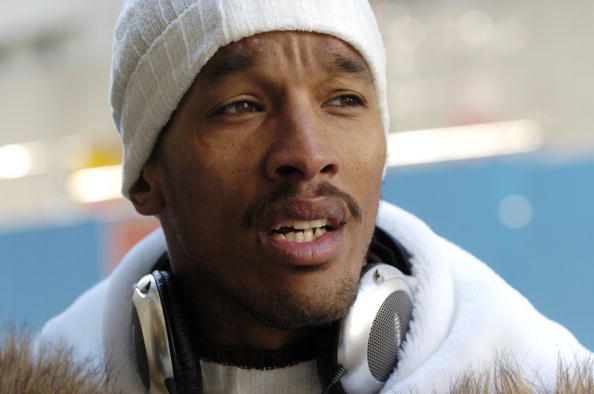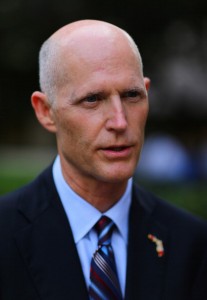
March 24, 2016 – AGM Road Trip Playlist 1
The road to Amnesty International USA’s Annual General Meeting and Human Rights Conference technically began in April of 2015, when the AIUSA Board of Directors chose Miami as the host city for our 2016 conference. The literal road trip to the conference began on March 24, when events staff and interns packed the boxes of materials and equipment that we will need to pull off a successful AGM. SEE THE REST OF THIS POST
Tag Archives: Florida
The Cruel And Pointless Effort To Execute John Ferguson

Despite several diagnoses of paranoid schizophrenia and even though the Supreme Court has declared executing the severely mentally ill unconstitutional, John Ferguson is scheduled to be executed in Florida on August 5th (Photo Credit: Joe Raedle/Newsmakers).
John Ferguson, a 65-year-old man with a long history of mental illness, including several diagnoses of paranoid schizophrenia by prison doctors, and who refers to himself as the “Prince of God,” is set to be executed in Florida on August 5th. His crimes were horrific, no question. Ferguson was convicted of a total of eight murders committed near Miami, earning him a total of eight death sentences.
But executing the severely mentally ill, or “the insane,” has been unconstitutional since 1986 when the U.S. Supreme Court ruled so in Ford v. Wainwright (a Florida case, as it turns out). In its decision, the Court, led by Thurgood Marshall, reasoned that it is cruel and pointless to put prisoners to death who don’t understand why (or in some cases even that) they are being killed.
Ignoring The Public To Speed Up Executions
On Friday late afternoon, Florida Governor Rick Scott signed the “Timely Justice Act,” a bill designed to speed up executions in a state that is responsible for more known wrongful convictions in death penalty cases than any other. As a result, there are “at least 13 inmates immediately eligible for death warrants.”
Governor Scott signed the bill after requesting to hear from the public, who responded by overwhelmingly urging him to veto it. As the News Service of Florida reported:
“As of Thursday, his office had received 447 phone calls, with 438 opposed to the bill; 14 letters, with 13 opposed; and 14,571 emails, with 14,565 opposed.”
Although Governor Scott, in signing the bill into law, ignored this public response, he does seem to have been impacted by it. He is now claiming that the “Timely Justice Act” is not meant to “fast track” executions, a claim seemingly disputed by the bill’s key sponsor, who said on Twitter that “Several on death row need to start picking out their last meals.”
Speed Kills
Is Governor Rick Scott of Florida trying to speed up his state’s death penalty? He’s signing more death warrants (three executions are currently scheduled over the next month), and he’s considering a bill passed by the legislature that would shorten appeals.
He of course can, and should, veto this bill – known euphemistically as the “Timely Justice Act” – and we should all urge him to do so.
Florida has the nation’s most error-prone death penalty, having seen more death row inmates exonerated (24) than any other state. And it’s possible that a 25th is on the way. With 75 executions since its death penalty was reinstated, Florida has set free one person from death row for every three that have been executed.
The national rate, still appallingly high, is about one for ten. Which, not coincidentally, is the name of an important film project whose organizers have been crisscrossing the country interviewing death row exonerees.
Their most recent interview was with Florida exoneree Juan Melendez, who spent nearly 18 years on the Sunshine State’s death row. In the petition linked to above Juan writes that:
Rushing To Judgment

Kharey Wise was wrongfully convicted of beating and raping a female jogger in Central Park in 1989 and spent 15 years in prison. He was released when the real assailant confessed to the crime (Photo Credit: Debbie Egan-Chin/NY Daily News Archive via Getty Images).
For many who remember the terrible crime, the huge outcry and the media circus around the 1989 “Central Park Jogger” case, which was BIG national news, it may have come as a surprise to learn that all 5 of the teenagers convicted were in fact innocent.
But it probably shouldn’t have.
The film The Central Park Five, recently premiered on PBS, offers an important cautionary tale about how a rush to judgment, fueled by all-in media coverage of a particularly heinous crime, increases the chances that criminal justice officials will make critical mistakes, or engage in deliberate misconduct. The Reggie Clemons case, tainted by allegations of police abuse during the investigation and prosecutorial misconduct during the trial, is a reminder that a process compromised in this way can result in a death sentence.
At the other end of the spectrum, a rush to judgment can occur when there is a callous indifference on the part of authorities toward a crime they may perceive as less important because it was committed in a marginalized community. That’s what seems to have happened in the Carlos De Luna case, where an almost certainly innocent man was put to death for a crime another man named Carlos probably committed.
Casey Anthony, Media Frenzy, and the Death Penalty

Casey Anthony with her attorneys before the jury presented a verdict in her murder trial. (Photo by Red Huber-Pool/Getty Images)
After years of being prosecuted by Nancy Grace, and weeks of being prosecuted in a real courtroom, Casey Anthony has been acquitted by a jury of murder charges that could have left her facing execution. Her acquittal of murder comes after a three-year media frenzy during which her guilt was more or less presumed. Some followers of the trial, saturated by this media coverage, were shocked by the verdict. Defense attorneys blasted the media circus (and the lawyers who participated in it).
Attorney Cheney Mason said:
“I’m disgusted by some of the lawyers that have done this. I can tell you that my colleagues from coast to coast and border to border have condemned this whole process of lawyers getting on television and talking about cases they don’t know a damn thing about.”
Increase in Crimes Against Muslims
We are deeply concerned about the growing number of reports of crimes committed against Muslims and of other anti-Muslim sentiment and activity in the United States.
Amnesty International deplores the stabbing of a Muslim cab driver in New York, the arson attack against a mosque construction site in Tennessee and the vandalizing of an Islamic center in California. These crimes, together with activities such as the proposed “International Burn a Qu’ran Day” sponsored by a Florida church and protests against mosques in other cities, foster a climate of fear, discrimination and persecution against Muslims. They have no place in a society that values freedom, justice and equality.
Amnesty International has long worked to promote and defend the right to freedom of thought, conscience and religion, which includes the right to manifest one’s religion or belief in worship, observance, practice and teaching, either individually or in community with others, in public or in private. We call for an end to rhetoric and actions that discriminate against any faith and stands in solidarity with all those anywhere who are persecuted for their real or perceived beliefs or identity.
Amnesty International urges authorities in the United States to take strong action against attacks directed at people of the Muslim faith. In a climate of fear and perceived external threat, it is essential that the authorities step up measures to ensure that people from all communities, whether citizens or not, are equally protected. U.S. authorities should continue to denounce intimidation and attacks against Muslims and make clear that crimes of hate and discrimination will not be tolerated.
Historic presidential race, but slavery persists in US
Surrounding the election of the first black President of the United States, much was made of the country overcoming its legacy of slavery, leading a reasonable person to conclude that slavery is actually history in the U.S.
But, from the agricultural fields of Florida flows a steady stream of reports of migrant workers being subjected to modern-day slavery – forced labor, beatings and withholding of pay included. (According to the Coalition of Immokalee Workers (CIW), in the last 10 years, 7 federal trials on farm labor slavery were prosecuted in Florida, involving 1,000 workers.)
CIW, with the help of The Alliance for Fair Food, the National Economic and Social Rights Initiative and other allies in the human rights movement, has been battling not only the State of Florida to take a more pro-active role in labor rights protections, but also has been taking on some of the biggest fast food chains in the world, including Subway, McDonald’s, Taco Bell and Burger King, which buy the tomatoes and other products they harvest, for better wages and working conditions.
CIW signed agreements with some of the companies on wage and conditions issues, but a statement from a Florida Department of Agriculture spokesperson in December again set off alarms that the state was underplaying the significance of the ongoing abuses in the field.
The Coalition is now asking Florida Governor Charlie Crist to step up his involvement, and have a letter-writing action on their site.
Dear Gov. Crist, didn’t you get the election night memo? Slavery is out.
